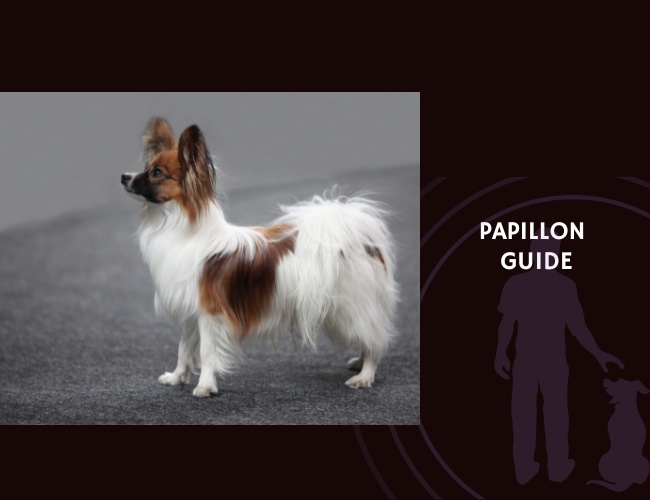Introduction to the Papillon
A Royal Heritage
The Papillon is one of the oldest toy breeds in Europe, with roots tracing back several centuries. Noble households and royalty often favored these dogs as cherished companions. Their elegance made them popular in paintings by famous artists, and their refined presence was a symbol of status and affection. Early Papillons were prized for their loyal and gentle nature, complementing the elegant lifestyles of European courts.
Distinctive Looks and Butterfly Ears
Perhaps the most memorable feature of the Papillon is its ears, which resemble butterfly wings. The name “Papillon” means “butterfly” in French, highlighting this distinct characteristic. The breed displays two ear types: the erect, fringed ears (the classic butterfly look) and the dropped “Phalene” style, which resembles a moth. Both types are covered with flowing hair that adds to their whimsical, delicate appearance.
The Papillon is a small dog, usually weighing between 2.5kg and 5kg. Despite their small framework, they are sturdy and agile. Their luxurious, silky coat is usually white with patches of black, brown, or sable. Their bright eyes and alert expression make them stand out as an engaging and lively presence in any home.
The Perfect Companion Dog
Papillons are known for being loving and highly bonded to their families. Their sociable nature makes them ideal for people who want a constant companion. These dogs thrive in households where they receive plenty of attention and affection, and they return that love with loyalty and enthusiasm. Beyond their affectionate nature, Papillons are intelligent and responsive, excelling in many activities, such as agility and obedience.
Their adaptability allows them to flourish in apartments or houses, as long as their daily exercise and emotional needs are met. Friendly, attentive, and animated, the Papillon is much more than a pretty face—they are dedicated partners who fill homes with energy and joy.
Moving forward, understanding their temperament will help unlock the secret to living harmoniously with these delightful companions.
Character and Behavior
Lively disposition and deep social bonds
The Papillon stands out for its cheerful, animated personality. Even though this breed is small, it fills a home with energy and warmth. Papillons are highly sociable and form strong emotional bonds with their families. They pay close attention to their people, often following them from room to room and showing lots of affection. This strong attachment means they thrive in loving, attentive households where they can interact regularly with their humans.
A Papillon often uses expressive body language and even sounds to communicate excitement, curiosity, or alertness. If you want a companion who responds eagerly to your voice and presence, the Papillon is a wonderful fit. Their friendly nature helps them connect with adults and older children alike.
Remarkable intelligence and eager problem-solving
Despite their tiny stature, Papillons have big brains! Historically bred for companionship, they inherited the intelligence and drive of their spaniel ancestors. This means they quickly learn tricks and commands, making them stars in activities like agility or obedience games. These dogs see training as a fun bonding time—not a chore.
Papillons are known for their problem-solving skills. They often figure out how to get what they want, whether it is reaching a favorite toy or solving a puzzle. Their cleverness requires mental challenges, so providing a variety of toys and activities helps keep them content and engaged.
Boldness and quick responses
Papillons do not let their small size shrink their confidence. They are often described as bold, persistent, and alert. When faced with something new or unfamiliar, they are likely to investigate rather than shrink away. This alertness does mean they are sensitive to changes in their environment—new visitors, unusual sounds, or sudden movement may prompt a response such as barking or running to check it out.
While their boldness and reactivity make them excellent watchdogs, it is important to provide reassurance and gentle boundaries to keep their reactions from becoming overwhelming.
As you get to know the Papillon’s energetic spirit, intelligence, and affection, you’ll see why so many families treasure this tiny but mighty breed.
Training and Education
Positive Reinforcement for a Smart Learner
Papillons are exceptionally intelligent and quick to learn. They thrive in training sessions that use positive reinforcement methods. These include treats, praise, or playful rewards. Punishment-based approaches can lead to fear or anxiety, so it is best to stick just to encouragement and rewards. This breed loves to please, so rewarding desirable behaviors—like sitting on cue or coming when called—helps reinforce good habits and keeps the experience fun for both you and your dog. Change up training games often to keep them interested and avoid boredom.
The Importance of Early Socialization
Socialization is just as important as obedience for Papillons. Starting young, gently introduce your dog to a variety of people, other pets, and everyday situations. This early exposure helps prevent “small-dog syndrome”—when a little dog becomes fearful, bossy, or excessively protective. Early socialization builds confidence and ensures your Papillon enjoys new experiences rather than becoming nervous or reactive. Lack of social exposure can lead to fear-based behaviors, nuisance barking, and even separation anxiety, so consistent and positive introductions matter a lot.
Mental Stimulation and Setting Boundaries
Papillons need plenty of mental challenges to match their lively minds. Beyond basic training, give them interactive puzzle toys, short trick lessons, or agility courses at home. Activities that reward their curiosity help prevent destructive behaviors and keep them content.
Clear, loving boundaries are key. Set simple house rules and stick to them—consistency helps your Papillon feel secure and reduces attention-seeking habits. Inconsistent limits confuse intelligent breeds like this and may reinforce unwanted actions. Mix up motivators during training such as food, praise, or a favorite toy to keep things exciting and positive.
With the right encouragement, mental games, and boundaries, your Papillon will shine as a well-adjusted companion ready for many adventures.

Nutritional Requirements
Energy needs and portion control
Papillons are small but lively dogs that burn energy faster than you might expect. Their tiny bodies and high activity levels mean they require an energy-dense diet. Look for food rich in quality proteins and healthy fats to meet their daily needs. At the same time, it is important to watch portion sizes. Overfeeding can quickly lead to weight gain, even with active dogs. Obesity is a common health concern and can lower the quality of life for the Papillon. You can use a kitchen scale or measuring cup to ensure accuracy at each mealtime.
Avoid giving too many treats or table scraps. While treats help with training, use them sparingly and adjust meal portions if your Papillon receives snacks during the day. Consistent meal times help build healthy eating habits and prevent picky behavior.
Dental health considerations
Dental health is a significant concern for Papillons due to their small jaw structure. Feeding dry kibble can help remove plaque from teeth, which lowers the risk of dental disease. Choose kibble in a size and texture appropriate for small breeds. For added support, offer dental chews—but always select types suitable for small mouths.
Try to avoid sticky, sweet, or very soft foods that can lead to tartar build-up. Regular tooth brushing is also highly recommended and should be part of the daily routine to maintain healthy teeth and gums.
Preventing hypoglycemia
Hypoglycemia, or low blood sugar, is a serious risk for Papillon puppies and any dog that is underfed. To help prevent this, feed your Papillon several small meals a day instead of one large one. Puppies, in particular, may need more frequent meals until they reach adulthood. Always keep feeding schedules regular and avoid long gaps between meals.
Sudden inactivity, stress, or missing meals can trigger hypoglycemia. Watch for signs like shakiness, weakness, or confusion, and speak with your veterinarian if you have concerns.
By ensuring proper nutrition, you support your Papillon’s vibrant energy and beautiful appearance, laying a strong foundation for a healthy and happy life.
Health Concerns and Care
Breed-specific health issues
Papillons are lovely and spirited, but like all breeds, they have their own set of common health concerns. One of the most frequent issues is patellar luxation. This is when the kneecap slips out of place. It often affects small breeds and can cause discomfort or changes in the way your Papillon moves. Regular checkups can help catch this early.
Dental disease is a major concern due to the Papillon’s small jaws. Plaque and tartar can build up quickly, leading to gum disease or tooth loss. Good dental care, like daily tooth brushing and dental treats, is essential for their long-term health.
Another important issue is progressive retinal atrophy (PRA), a genetic eye disorder. PRA can cause vision loss over time. While not every Papillon will get this, being aware and scheduling regular eye checks with your veterinarian can help monitor your dog’s eye health. Some Papillons may also face problems like open fontanelle, where a soft spot remains on the head, or less commonly, conditions like a collapsed trachea, heart murmurs, or seizures. Responsible breeders should screen for these conditions to help reduce the risk in puppies.
Preventive care measures for optimal health
Preventive care is key for keeping your Papillon happy and healthy. Here are a few simple steps:
- Schedule regular veterinary checkups for early detection of health issues.
- Keep up with vaccinations and parasite control.
- Make dental hygiene a priority. Brush your dog’s teeth daily and provide dental chews.
- Walk your Papillon daily and offer playtime to keep joints healthy.
- Feed a balanced diet with portion control to prevent weight gain.
By taking these steps, you can help your Papillon avoid many common issues and promote overall wellness.
Lifespan and factors affecting longevity
Papillons generally live 13-16 years, thanks to their small size and active nature. Factors that support a longer life include:
- Consistent preventive vet care
- Proper nutrition
- Good dental hygiene
- Joint care and regular exercise
By understanding your Papillon’s health needs and providing attentive, loving care, you help them enjoy a long, vibrant life.
As you become familiar with their health needs, it’s also important to consider their daily environment and exercise routines for a holistic approach.
Elegant. Fierce. Unforgettable.
Butterfly by Name. Firecracker by Nature. Don’t let the delicate frame fool you—Papillons are miniature dynamos with the heart of a lion. Their flowing ears may flutter like wings, but their minds move even faster.
Brains Over Brawn. These aren’t lapdogs—they’re life partners. Papillons crave puzzles, purpose, and your full attention. Whether mastering agility or snuggling into your schedule, they demand—and deserve—a seat at the table.



Big Soul in a Small Body. Few breeds pack this much personality into so little space. Papillons are companions in the truest sense: sharp, loyal, expressive, and always tuned into your emotional world. They’re not just pets. They’re co-pilots.
Ideal Living Environment
Adaptability to Different Homes
Papillons are well-known for their ability to fit into many types of homes. Whether you live in a cozy apartment or a spacious house, this breed can thrive if its physical and mental needs are met. Their small size makes it easy for them to navigate tight living spaces, while their adaptable nature helps them adjust to new environments quickly. It is important to remember, though, that no matter the setting, Papillons need a safe, stable atmosphere to remain happy.
Daily Exercise Needs
Even though Papillons are little, they have a lot of energy. To keep them healthy and prevent boredom, give them 45-60 minutes of activity each day. This can include walks, play sessions, or even fun indoor games. Activities like fetch or agility training are perfect options for these quick-footed pups. Regular movement not only benefits their bodies but also helps keep their minds sharp.
Social and Emotional Needs
Papillons form close bonds with their families and are emotionally dependent on their human companions. They thrive in homes where they receive lots of attention, love, and interaction. If left alone for too long, they can develop separation anxiety or unwanted behaviors. These dogs are not ideal for families with rough or unpredictable children, as they prefer gentle handling and a consistent routine. Providing mental stimulation, like puzzle toys or new learning challenges, will also keep them happy and prevent stress.
Creating the Right Atmosphere
For a Papillon to feel comfortable, offer a routine with time for rest and play. Designate a quiet space in your home where your dog can retreat when it needs peace. Satisfying their social needs and making them feel like part of the family will help them flourish.
With the right balance of exercise, attention, and emotional support, your Papillon will truly feel at home 🏡.
Mental Enrichment and Well-being
Keeping your Papillon’s mind active
Papillon dogs are spirited and clever, so mental stimulation is just as important as physical exercise. These little dogs love to learn and solve problems. Without enough mental activity, they can get bored and sometimes mischievous. Using puzzle toys is a great way to challenge their intelligence. Hide treats in the toys and encourage your Papillon to find them. Rotate different toys and introduce new games to keep things interesting. Try teaching simple tricks or agility exercises to give them a task and let them show off their clever nature.
Building safe spaces and secure routines
Even the most confident Papillon needs a place to feel safe. Create a comfy spot just for them, like a dog bed in a quiet room or corner. This safe space allows your dog to calm down if the home gets busy or noisy. Consistent routines also help Papillons feel secure. Feed, walk, train, and play with them at similar times each day. Knowing what to expect helps your Papillon trust that their needs will be met, which lowers stress and supports emotional well-being.
Balancing brain work with rest
Papillons are enthusiastic learners, but too much mental challenge can overwhelm them. Structure their day with a healthy balance of activity and downtime. After a training session or puzzle game, give your dog time to relax in their safe space. Watch for signs of tiredness—like yawning or restlessness—and encourage short breaks as needed. Adequate rest is just as important as play for keeping your Papillon happy and healthy.
By focusing on mental enrichment, routine, and comfort, you help your Papillon thrive in body and mind. This sets the stage for a joyful and rewarding life together, no matter your family or home.

Papillons and Family Life
Compatibility with household dynamics
Papillons are famous for their loving and social personalities. These little dogs enjoy being close to their humans and are happiest in homes where they get lots of attention and interaction. They adapt well to many household types, from quiet apartments to busy family houses, as long as their need for company is met. Papillons thrive on routine and do best when their days follow a predictable schedule. They develop strong bonds with their families, providing lots of affection and joy.
However, it is important to remember that Papillons are sensitive and do not like rough handling or unpredictable situations. Homes with very young children may not be a perfect fit unless the children can be gentle and respectful. If you have children, teaching them how to approach and play with a small dog safely helps keep everyone happy and safe.
Considerations for homes with children
Papillons are playful and curious, making them enjoyable companions for older children who understand how to handle small pets. Their delicate size means they can be hurt easily during play. Always supervise playtime between your Papillon and children to prevent accidental injuries. Setting clear rules about gentle behavior not only protects the dog but also helps children learn respect and empathy.
Papillons can get along with other pets if introduced properly, adding to their appeal in multi-pet households. Early socialization and ongoing supervision ensure positive interactions.
Building strong bonds through interactive play and training
Papillons are very intelligent and enjoy interactive games that challenge their minds. Activities like fetch, trick training, or agility help them burn energy and deepen the human-animal bond. These dogs love learning new things and will shine in any activity that involves positive reinforcement. Including your Papillon in regular family routines—like daily walks or puzzle games—makes them feel like a true member of the family.
Creating a connected, friendly environment where your Papillon feels loved is key to a strong, lasting relationship. This makes life more fulfilling not only for your dog but also for everyone in the household. 🐾
Moving beyond family life, paying attention to regular grooming and maintenance will help maintain your Papillon’s health and happiness.
Grooming and Maintenance
Caring for the Papillon’s Distinctive Coat
Papillons are famous for their silky, flowing fur and those unique butterfly-like ears. Their coat may look regal, but it’s surprisingly easy to manage with the right routine. Papillons do not have an undercoat, so they tend to shed less than other long-haired breeds. A gentle brushing two to three times a week keeps their fur smooth, prevents tangles, and removes loose hairs. Pay extra attention behind the ears, on the belly, and around the rear legs where mats can form. During seasonal changes, you might notice slightly heavier shedding and may want to brush daily.
Bathing does not need to be excessive. Every four to six weeks is usually enough, unless your Papillon finds an extra muddy adventure! Use a dog-specific gentle shampoo to avoid skin irritation, and always dry their ears thoroughly to prevent moisture build-up.
Dental Hygiene for a Healthy Smile
Dental health is a serious concern for this breed because of their small jaws and crowded teeth. Plaque and tartar can quickly lead to gum disease if not managed properly. Adopt a routine of brushing your Papillon’s teeth at least three times each week. Use a soft-bristle brush and a toothpaste made for dogs—never regular human toothpaste.
Introducing dental chews, crunchy kibble, and professional cleanings during vet checkups are also good habits. Maintaining healthy gums and teeth not only helps avoid bad breath but also supports your Papillon’s overall well-being and longevity.
Regular Grooming Routines
A well-structured grooming schedule is supportive for your Papillon’s health. Besides coat brushing and dental care, check their nails every two weeks. Nails that are too long can cause pain or affect movement. Ears should be checked weekly for dirt, redness, or odor—these signs could signal an infection. Wipe the ears gently with a damp cloth or a vet-approved ear cleaner.
Don’t forget a quick daily check of their eyes for any discharge or cloudiness, and always reward your Papillon with love or treats after each grooming session to make it a positive experience. 🛁🦷
With proper grooming, your Papillon can always look and feel their best, ready for plenty of joyful activities ahead.
Conclusion: Is a Papillon Right for You?
Weighing the Key Considerations
Choosing a Papillon comes with both joys and responsibilities. This breed is known for its animated personality and deep attachment to people. If you are looking for a dog that loves to interact, craves learning, and fits well in many living spaces, the Papillon may be a perfect match. However, they do need daily exercise, mental challenges, and plenty of affection.
Papillons do best in homes where someone is present much of the day. Left alone too long, they may develop separation anxiety or become vocal. Their small size makes them vulnerable, so gentle handling and supervision around young children are essential. Consistent training and early socialization are important to foster good habits and confidence.
Enjoying the Benefits
Bringing a Papillon into your life means gaining an intelligent, devoted companion. These dogs are quick learners, excelling in dog sports and obedience games. Their adaptability means they thrive everywhere from apartments to larger homes, provided their physical and mental needs are met. The Papillon’s cheerful spirit can bring happiness to families, singles, and seniors alike.
With an average lifespan of 13-16 years, Papillons offer lasting friendship when properly cared for. Their manageable coat and small stature mean grooming and exercise are easy to incorporate into a busy routine. Their alert, animated presence offers both companionship and a little extra home security.
Understanding the Challenges
Potential owners must be aware of breed-specific health issues such as patellar luxation, dental disease, and progressive retinal atrophy. Regular vet visits are required, as well as ongoing attention to dental hygiene and joint care. Strict portion control is key to prevent obesity, and consistent feeding schedules help protect against hypoglycemia in puppies and small adults.
Socially, Papillons need frequent interaction and can become stressed by boredom or isolation. Households with rough or unpredictable activity may not be the best fit for this delicate yet spirited breed.
Resources for Support
If you are considering bringing home a Papillon, reach out to reputable breeders, trainers, and breed-specific organizations. These resources can offer advice on health, nutrition, and care based on expert knowledge and real-world experience. Connecting with Papillon communities online or in person is also a great way to learn, share, and ensure your new companion thrives.
Choosing a Papillon should be a thoughtful process. Take your time, gather information, and be honest about your lifestyle and commitments. With the right match, the companionship of a Papillon can brighten your home for many years to come.










